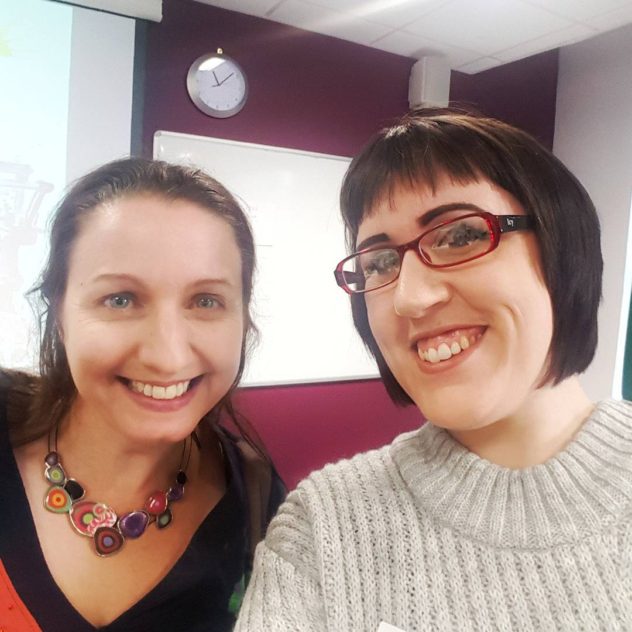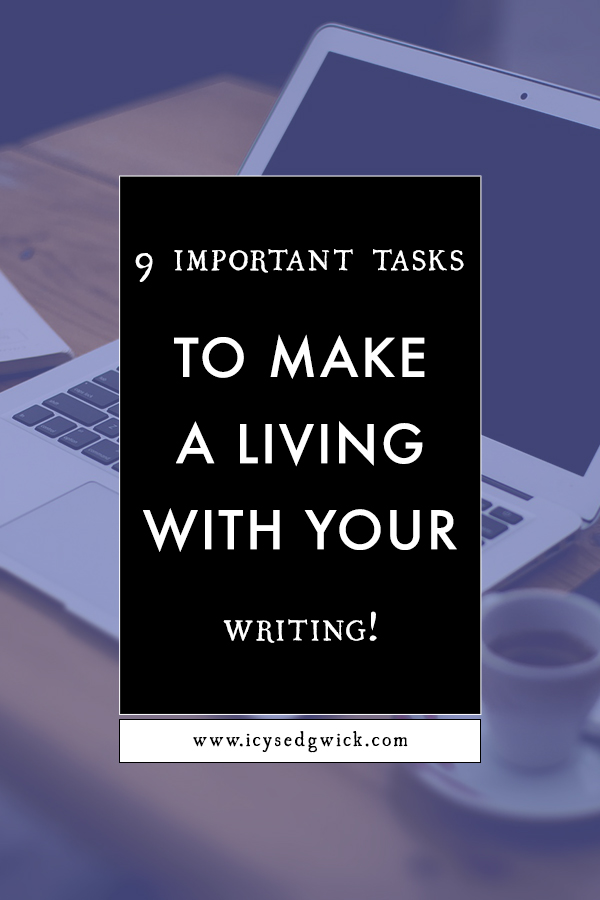It’s only natural to want to make a living with your writing. But it’s also incredibly difficult! After all, you’ll be competing with thousands of other authors. And with readers trained to expect books for free, you might think it’s an uphill struggle.
But writers like JF Penn prove that it is possible. I went to her workshop with Orna Ross in November to discover ways to make a living with your writing. Here are my 9 takeaways!
1. It’s essential to define your idea of success.
Your idea of success is different from mine. Neither is right, or wrong. It all depends on you. So will you be successful when you get more than ten 5* reviews? Or when you earn enough in royalties that you can quit your day job?
Defining your idea of success brings you a step closer to understanding what you need to work on in order to make a living with your writing.
2. A book is not ONE product.
It can be really easy to think of a book as one thing. It’s, well, a book. Not so! One title can be an e-book, a print title, or an audiobook. For non-fiction, that book can become a workbook or a course.

Remember different people consume media in different ways. So make your book available to suit what they want!
3. It’s worth selling on more than 1 platform if you have more than 1 book.
There are definitely advantages to using KDP Select if you only have one book. You’ll get better visibility. Earning money from page reads becomes possible. Using your in-built free days helps to build your email list.
But if you have more than one book, think about going wide. After all, you don’t want all of your income to come from one place. If Amazon suddenly went bust, you’d still be able to sell books on Kobo or iBooks. Thinking long term helps you to see new ways to make a living with your writing.
4. People love bingeing on the culture they enjoy so consider writing a series.
Just look at the popularity of box sets and streaming services like Netflix! These forms of media train people to expect new content involving characters they like and worlds they enjoy. Writing a series allows you to satisfy these demands. Once readers fall in love with your characters, they click through to grab the next instalment.
Plus, writing a series can lead to a box set. While you might earn less on sales of individual books, you’ll earn more from box sets since readers understand their value.
Writing a series also makes it quicker to write since you’ve already done the world-building!
5. Work out your author brand and be consistent.
I often tell people that your brand is what people say about you when you’re not in the room. So people email me cool or weird things like articles on Atlas Obscura. Or they tag me in peculiar posts on Facebook about things like edible chocolate skulls.

Why? Because my ‘brand’ revolves around the weird, the bizarre, and the odd. The Gothic rests at the centre of what I do. Even if I’m writing dark fantasy (my Underground City books owe a great debt to Victorian London) or Westerns (To Kill A Dead Man is most definitely a weird Western!)
Figure out what your brand is and stick to it. People gravitate towards anyone who has things in common with them – so make it clear you’re that person!
If you want help in getting your author brand started, then sign up for my free 5-day email course below.
6. You have to be clear on what you want for yourself to know what opportunities to say ‘no’ to.
When you start out, sometimes you worry that you have to accept every opportunity that comes your way. After all, if you turn things down, are you missing out? If you don’t know what you want for yourself, then you agree to everything “just in case”.
But once you’ve defined your idea of success it makes things much easier. You’ll know that an opportunity won’t benefit you in the long run. So you’ll feel more confident in saying ‘no’.
If you want to make a living with your writing then you definitely need to find a way to make time to write. It’s also a good way to find your own creative mentors. I’d never met Joanna Penn previously, but I’d always considered her a mentor. So when I saw the opportunity to learn from her in person, I jumped at it!

7. As an author, you are your own Creative Director. But you must learn to collaborate with others.
Calling yourself a Creative Director sounds daunting. But if you want to make a living with your writing then you are a business. You’re an authorpreneur! So you will need to learn a range of skills in order to put your book out. Formatting your books, managing your website and running your email list are all skills you can (and should) learn. That said, you don’t have to do
That said, you don’t have to do everything yourself. Learning to collaborate with others means you can offload things you’re weak at. Let someone who’s much better at it do it – even if that means paying for it. That way, you’ll have more time to actually work on your assets. In other words, get your books written.
8. Be authentic throughout everything you do.
Your voice is one of the main reasons people will buy your book. You are the reason people read your blog. The moment you start promoting products you don’t use, or censor yourself, you run the risk of being inauthentic.

People will notice. And people don’t like to feel like they can’t trust a person. They like to know that what they see is what they get. So be yourself. Be your brand.
9. If you want to make a living with your writing you need to design a life, not another job!
So you’re keen to make a living with your writing. There’s no point in swapping one job for another. Remember that making a living as an author involves a lifestyle. Maybe you want to be able to travel more. Perhaps you’d like to be able to work at a time of day that suits your body clock. Whatever it is, be intentional about what you include in your writing life – and what you exclude.
It won’t be all sunshine and roses, but having control over your life as an author gives you a degree of control you never had in a regular day job!
I hope you found those takeaways helpful! I’ve included links to two of Joanna’s books about making a living with writing below. But I also recommend you check out her blog at The Creative Penn!
For some super useful information on self-publishing, try Successful Self-Publishing: How to self-publish and market your book in ebook and print. You can pick it up for free from Amazon (aff link). I also highly recommend How To Make A Living With Your Writing: Books, Blogging and More, also by Joanna Penn. You can grab it from Amazon (aff link). If you’d like other recommendations for books, blogs and podcasts to help your writing, grab my download below!
If you’re struggling on bringing your author brand together, sign up for my free 5-day email course below and we’ll get you started!
Confused by this author brand stuff?
Get some clarity and get stuck into fonts, colours, and the reason you need an author brand in my free 5-day email course. By signing up, you also consent to receive occasional emails of useful tools, resources, and fun stuff for writers!







I couldnt agree more!
Excellent post, Icy! The part about developing your author brand and being consistent, as well as learning when to say ‘no,’ really resonated with me. I write across two genres and have had trouble with clear branding and sending a uniform message to potential readers, so it’s nice to hear that others struggle with it, too.
I struggle with it too. I’ve got my Westerns and dark fantasy and its difficult to find a link between the two.
Dark fantasy set in the wild west? Doesn’t quite work. (Even when done by Stephen King – “The Dark Tower” series is impenetrable to me.) I feel your pain. Urban fantasy set in modern Boston + far-future, dystopian sci-fi. Not a natural fit. I like your idea of the earnest voice, though. Those two genres overlap for me because they’re what I’m interested in. As long as I stick to my genuine interests, potential readers should still be able to connect.
Yeah, people really don’t like my weird Westerns! I think I might have to stick with my Gothic horror in future. They’re the stories I read the most.
Thank you for introducing me to Atlas Obscura. I feel like this is one of those things I should have known about years ago, but for some reason it never percolated to the top of my conscious awareness.
Anyway, another great post, Icy!
Thank you! I love Atlas Obscura.